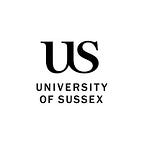“I’d always been a ‘land’ person. Now I’m passionate about the sea.”
Biology undergraduate Stella Saunders has been surveying kelp fields off the Sussex coast as part of her University of Sussex Junior Research Associate project.
I saw a request for applicants for the Junior Research Associate (JRA)scheme and I thought it would be a good experience to write a proposal. I’d never done anything like it before and I was so happy when my proposal was accepted.
I’m working with Dr Mika Peck and Dr Valentia Scarponi to analyse kelp, a seaweed that grows up from the seabed, along the Sussex coast. A temporary byelaw came into effect this year banning sea trawling in a nearshore area from Shoreham to Selsey to help with the recovery of the kelp fields.
Kelp is like the rain forest of the seas because it encourages a density of different species. It’s also quite a good storm defence, protecting species from harsh waves. But it has disappeared completely in some areas because of bottom trawling, which catches and destroys almost everything.
For my project, I’m monitoring an area outside of the byelaw that’s still exposed to trawling. I’m also monitoring Kingsmere Marine Conservation Zone (MCZ) which offers protection by restricting the fishing quotas of selected species during different times of year. I’ll then compare these to the area now protected by the byelaw. I aim to discover if the past conservation measures are as effective as the new trawling ban could be, and whether MCZs are proving enough protection in general. There are three JRAs working on this project overall. Together we’ll make a poster for the main findings and then we’ll do ones for our individual JRAs proposals.
We spent two and a half weeks out on a boat every day to do the monitoring. Fortunately I don’t get seasick, and we had sunshine every day. We’ve been using baited remote underwater video equipment (BRUV) to capture what’s going on, and now we’re doing our analysis. It is amazing to see some of the species, but where the trawling has taken place there should be a lot more. There’s still a variety of habitats, but there’s no kelp. What we are seeing mostly are just rocky floors.
The survey is going to continue for five years as part of the Sussex Kelp Restoration Project, although sadly my part in the survey ends this year. If we can show regeneration, particularly of species such as mackerel, herring and common sole, then hopefully the byelaw will be extended. It’s industrial trawling that’s the issue. The local fishermen recognise that the ban will boost fish populations and are on board with the conservation work that’s going on.
My family home is Oxford and I am about the furthest you can be from the beach. I’d always been more of a land person, but I’d recently watched Seaspiracy — a documentary about what fishing is doing to our oceans. I’d always been more concerned about conservation on land but being part of this project has opened my eyes to the importance of conservation efforts in our oceans.
I’m going to Egypt and going scuba diving with the University. Before the survey, it had never occurred to me that I would want to go in the sea. Now I’m so passionate about it and so grateful that I have done this. I hadn’t swum in the sea until coming to Sussex and now I want to do it all the time.
From the age of 10 I’ve been watching TV documentaries about nature and the environment, and I’m thrilled that Sir David Attenborough is behind the kelp restoration project. I’m from a family of scientists — my dad has worked in environment jobs and my mum studied metallurgy — so that interest in science always trickled down. I knew I wanted to do biology and I’m interested in conservation, but now I’d like to do something that has a wider impact
I am interested in a career in environmental policy. I want to make some positive changes. Conservation is important but I don’t want to focus one area. I’m interested in how we can make wider policy changes around initiative such as rewilding. When we look at the green English landscape, we don’t realise just how degraded it has become in terms of biodiversity.
I’m really looking forward to being back on campus for my final year. Lectures were fine online but I didn’t find seminars so enjoyable. I did find that a lot more people were engaged in the chat during lectures. Professor Adam Eyre-Walker’s lectures were particularly great as everyone would engage in the chat.
Interview by Jacqui Bealing
www.sussex.ac.uk
